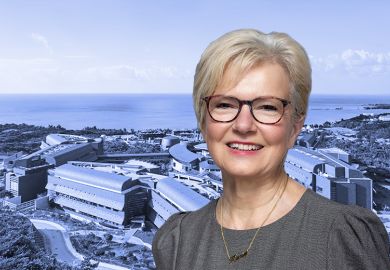In the early years of his academic career as a geography lecturer, Bob Allison never met a vice-chancellor and didn’t even know that pro vice-chancellors existed.
“I had no concept of what those roles were,” Professor Allison said in an interview with Times Higher Education at the end of his first term as Loughborough University’s vice-chancellor and president.
“Part of me says that is absolutely right, because what I want to do (now) is generate an environment where staff early in their career have space to research and teach.”
Nevertheless, the former University of Sussex pro vice-chancellor for strategic planning, research, enterprise and innovation also regards “being seen around campus” as an important part of his new role, which he took up in September. And the pleasantries he exchanged with virtually everyone he encountered on a brief tour of what he proudly declared to be the second-largest campus in the country suggested he has already got to know a lot of people.
He said the “grandiosity” of vice-chancellorship had never been an attraction for him, noting that his position came without a residence or a car - not even a reserved parking space. Although he was initially wary of the open-plan office he inherited from his predecessor, Shirley Pearce, this feeling soon fell away, he said, once it became clear how it facilitated the exchange of ideas with the other senior managers who share the space with him.
Professor Allison said that “complete confidence” in his senior team allowed him, on occasion, to delegate the daily running of Loughborough to provost and deputy vice-chancellor Chris Linton, freeing him to “work on behalf of the university outside the university”. He regarded this as a crucial role given “the challenges in an increasingly globalised higher education marketplace”, to which he was not convinced all university management structures were well adapted.
The “fairly small number of high-level strategic drivers” recently unveiled by Professor Allison at Loughborough involve “building excellence” through recruiting top staff and students and growing its “capacity and influence”.
He said he was proud of Loughborough’s reputation for excellence in sport and engineering, and believed it gave the university an enviably clear identity. But he said he was also determined to maintain a broad spread of subjects - “not least so students have the opportunity to interact in a way that adds something to the broader student experience”.
He said Loughborough would continue to charge £9,000 fees, while striving to ensure that “anyone who comes here, by the time they get to the end of their Loughborough journey, recognises that it is a reasonable figure”.
He is even prepared to put his own shoulder to the teaching wheel - provided colleagues don’t feel he is “foisting myself upon them” - since “it helps remind you what it is all about”.
But won’t all this enthusiasm fade once the novelty of being in the top job wears off?
“I agree [people might expect that], Professor Allison said. “But I would say to them: come back in five years and find out.”
Register to continue
Why register?
- Registration is free and only takes a moment
- Once registered, you can read 3 articles a month
- Sign up for our newsletter
Subscribe
Or subscribe for unlimited access to:
- Unlimited access to news, views, insights & reviews
- Digital editions
- Digital access to THE’s university and college rankings analysis
Already registered or a current subscriber?




